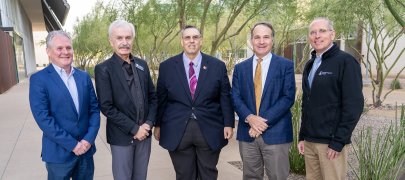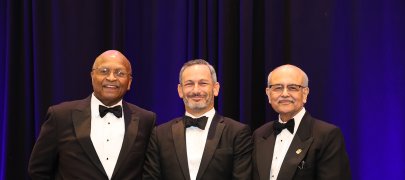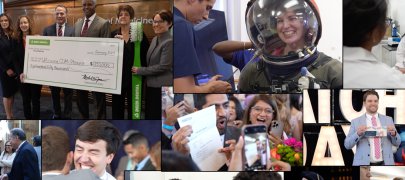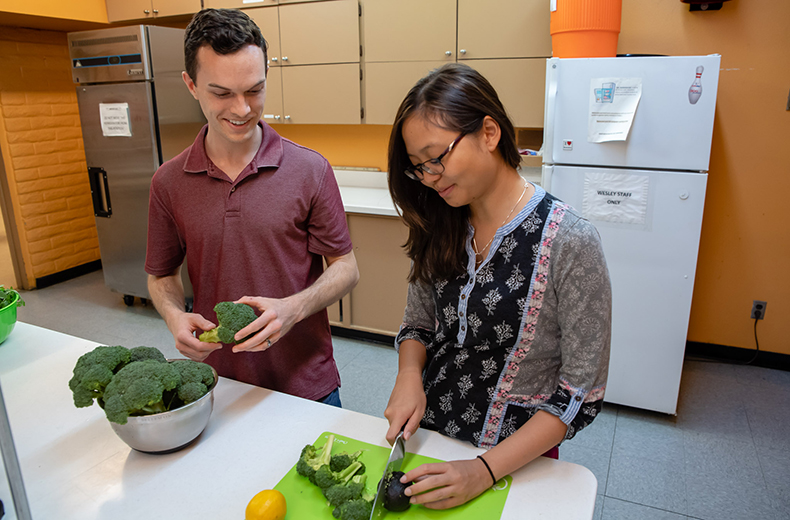
Medical School Cooks Up a New Way to Teach Students About Nutrition

Medical students at the University of Arizona College of Medicine – Phoenix are stepping out of the classroom and into the kitchen to learn how nutrition can improve the lives of their patients.
Under the guidance of a professional chef, the student-led Culinary Medicine Interest Group hosted a class at the Wesley Community and Health Center kitchen in south Phoenix to teach medical students cooking skills to make healthy meals.
The classes were organized by second-year students Julie Tran and Tyler Bien, and Farshad Fani Marvasti, MD, MPH, director of the Public Health, Prevention and Health Promotion theme.
“The overall goal of this initiative is to become part of an integrative medicine program at Wesley, serving patients and empowering them to manage their diseases through nutrition and cooking education,” Tran said.
Bien added, “We hope this will bring some much-needed attention and help students realize how cooking and healthy eating should be included in patient care.”
The Wesley Community and Health Center is part of the college’s Community Health Initiative – Phoenix, a program where medical students demonstrate their commitment to serving the greater Phoenix area and bettering overall community health. The opportunities at Wesley allows students to provide care to uninsured and underserved populations.
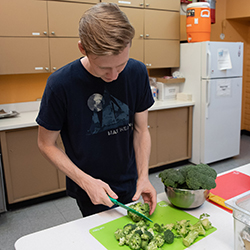
The Joy Bus is a non-profit organization that prepares locally sourced, healthy meals and delivers them to cancer patients. Caraway donated her time, knowledge and some local farm fresh produce and quality ingredients for the cooking session.
“It is a brilliant idea and very much needed within the medical community,” Caraway said. “I hope students realize the healing power of food. Not only can ‘real’ food heal the body, it can nourish the soul.”
Bien and Tran hope to start student-led cooking classes with patients later this year.
“There is an increasing recognition that medical students and physicians are lacking in their nutrition training and knowledge,” Bien said. “We want this to be an experience that further opens the door to the exploration of healthy food and nutrition as a crucial part of patient care. By bringing our students and patients together in a cooking class, everyone benefits. Students not only gain cooking skills and nutrition knowledge, but they will be working with patients to manage their health in a unique, fun way.”
Tran and Bien received a grant from the Office of Diversity and Inclusion to support their efforts. The funds allow the group to buy ingredients and rent the space for at least three more sessions.
“The funding will help us further gauge student interest and may open up future possibilities of other educational resources, such as pamphlets, podcasts or video tutorials on nutrition and how to appropriately use food as medicine,” Tran said.
The two said they feel fortunate to be working with so many passionate people who want to make this idea a reality, and appreciate the support of the Office of Diversity and Inclusion.
“We are excited about healthy eating and hope to keep growing this effort,” Tran said.
About the College
Founded in 2007, the University of Arizona College of Medicine – Phoenix inspires and trains exemplary physicians, scientists and leaders to optimize health and health care in Arizona and beyond. By cultivating collaborative research locally and globally, the college accelerates discovery in a number of critical areas — including cancer, stroke, traumatic brain injury and cardiovascular disease. Championed as a student-centric campus, the college has graduated more than 900 physicians, all of whom received exceptional training from nine clinical partners and more than 2,700 diverse faculty members. As the anchor to the Phoenix Bioscience Core, which is projected to have an economic impact of $3.1 billion by 2025, the college prides itself on engaging with the community, fostering education, inclusion, access and advocacy.
